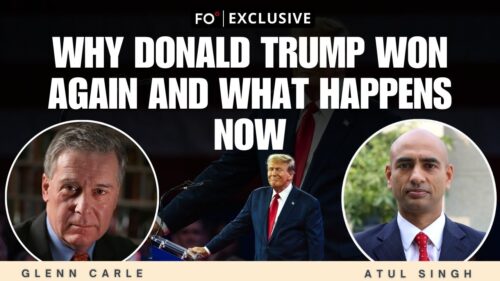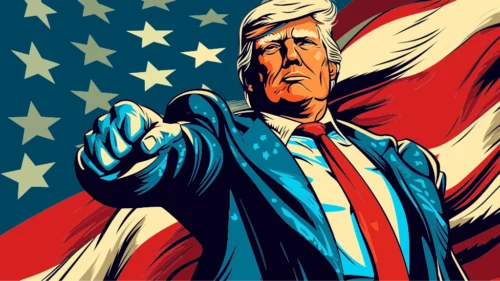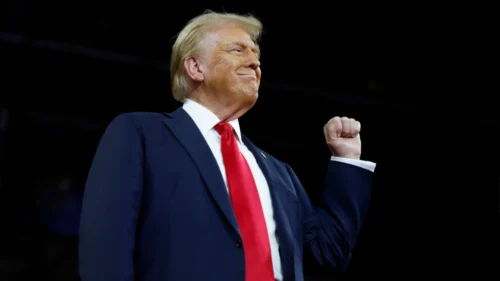Donald Trump won a decisive comeback victory this year, four years after losing to Joe Biden. In 2016, Trump won the majority in the Electoral College, but Hillary Clinton won a majority of the votes cast by citizens. This time, Trump won both the Electoral College and the popular vote. Furthermore, Republicans took control of both the Senate and House of Representatives, despite the fractious infighting in the latter chamber over the last two years.
Antoine van Agtmael is one of the most astute observers of trends in politics, society and economics. This Dutchman-turned-American coined the term “emerging markets” in 1981 and still retains a sharp radar. This time, he anticipated a Trump victory. Two weeks ago, he sat down with FO° Editor-in-Chief Atul Singh to record an episode of FO° Podcasts and share his thoughts on why Trump won and what happens now.
Agtmael did a probability analysis every month this year. In February, Agtmael thought Trump had an 80% chance of victory. After the Trump–Biden debate, he upped the figure to 90% and, once Trump survived the assassination attempt, Agtmael gave him a 95% chance of victory. A good convention and a decent performance at the debate helped Kamala Harris to make it a 50-50 contest, but Trump pulled away and won.
Agtmael thinks Trump won because he connected with the voters while Harris did not. In part, Trump connected because he used social media well, but he was also able to tap into voter sentiment. As a result, he broadened the Republican base, perhaps for decades to come. Trump also bet on men whose condition is best captured brilliantly in the book Of Boys and Men by Richard Reeves, while Harris bet on women. These men turned out to support Trump, while the women did not support Harris in a similar manner, which surprised Agtmael.
Furthermore, Agtmael points out that Democrats were out to lunch and failed to recognize that they were now perceived as elites. The irony, or rather tragedy, is that the demos — the Greek term for the common people — have achieved a Pyrrhic victory. The demos will suffer because a bunch of elite billionaires will get their tax cuts. Another irony is that the man who has promised to make America great again will make America small instead.
Why is populism rising in developed countries?
Trump is a developed-country phenomenon. In European countries too, populists have come to the fore. The working classes in these countries are voting for populists who offer quick fixes to complex problems. A large part of the population has lost faith in democracy. Many people now believe that policymakers do not listen to them or care about them.
In the case of the US, Democrats aided Trump’s victory. There were flaws in the candidate and the campaign. More importantly, the Democrats have lost their way. The woke culture in the party headquarters and the universities is out of sync with the country. The Democrats did not address voter concerns about inflation, food inflation and the cost-of-living crisis.
Food, gas, childcare, healthcare and universities cost a lot of money. Also, the children of elites find it easier to get into top universities than their counterparts with poorer parents. Democrats could justifiably point to statistics and argue that the economy was doing well but, to their misfortune, the people did not feel the benefits of better abstract economic figures. Too many Americans were barely keeping their head above water. Thus, inequality has undermined democracy.
Furthermore, diversity may be good, but it is a political problem. Democrats could not manage to appeal to Arab votes in Detroit and Jewish votes in Philadelphia at the same time. Similarly, conservative Muslim families definitely do not support Democrats’ fixation with trans issues.
What happens now that Trump is back?
Trump’s picks are a mixed bag. Some, like the incoming Treasury secretary and his chief of staff, are clearly competent. Others might not be so competent. Still others are questionable. What is clear is that Trump 2.0 has been faster out of the starting gate. He has priorities and a plan. Trump will have far fewer brakes this time around in terms of people around him or the Congress or the Supreme Court. More of what he wants will get done.
It is also clear that press freedom will suffer. Some good may come of this. The woke excesses will be undone. Yet the risk of lower freedom is that unchallenged ideas tend to be bad ideas and make for bad policies.
Economically, the Trump phenomenon has happened partly because the American winners of globalization never compensated the losers across their country. That is why Trump opposed the Trans-Pacific Partnership (TPP) and abandoned it. Note that Clinton was unclear on the TPP during her campaign and that Biden never resuscitated it. The abandonment of the TPP signals the end of multilateralism.
The end comes as a reaction to the decline in US dominance of the global economy. Innovation is now becoming more widespread. Chinese carmaker BYD Auto makes better cars than Elon Musk’s Tesla. The Chinese have bet on the age of electricity, investing in solar energy, windmills and batteries. Tariffs are a sign of weakness, and Trump’s adoption of protectionism shows that the US lags behind in key industries and key technologies.
Biden instituted policies to make the US catch up. He brought back new types of jobs and revived manufacturing. Taiwanese company TSMC has started fabricating semiconductor chips in the US. In fact, the yield of its factory in Phoenix is higher than that of its factories in Taiwan. Biden has addressed the stupidity of past policy in allowing chips, the strategic technology of our time, to be fabricated next to China and in an earthquake zone even when margins were as high as 50%.
This policy was beyond idiotic, but now TSMC makes chips in Germany and Japan in addition to the US. Dutch company ASML makes the machines that fabricate chips. German companies Trumpf and Zeiss make the lasers and lenses, respectively, that fabricate chips. While these are monopolies, the semiconductor supply chain is much more secure with TSMC operating in the US and Europe. Trump will take credit for the success of many of Biden’s policies and trends that were bringing smart manufacturing back to the US before he burst on the political scene.
Related Reading
The end of an era but reason for hope
Mercantilism is back. Geopolitics is determining economics once again. Yet Agtmael cautions not only against protectionism but also against industrial policy. It has its place. John F. Kennedy triggered innovation in the American economy by deciding to put a man on the moon. At the country’s inception, the US employed protectionism to boost infant industries and ensure that it did not end up as a supplier of raw materials to Europe like Latin America. Yet such policies must be like a small garden with a high gate. In general, reliance on markets works better than reliance on the government.
Finally, Agtmael cautions against pessimism. We may not be better off compared to 10 years ago, but we are certainly much better off than a hundred years ago. Yes, there has been a populist backlash and democratic backsliding, but we do not have Joseph Stalin killing millions and Mao Zedong launching a Great Leap Forward today.
Agtmael has benefited from globalization in terms of prosperity, contacts and democracy. Now, the first, second and third worlds are returning. The US and its allies are the first world. China and Russia form the second. Other countries form the third world. Two risks confront the world. First, the race to develop AI, the winner of which is not certain. Second, rising geopolitical tensions, which increase the possibility of miscalculations.
For all the risks, the world is still a lot better than the time when women did not have the vote and when third-world countries were colonies of European powers. So, there is good reason to be optimistic and retain hope.
[Peter Choi edited this podcast and wrote the first draft of this piece.]
The views expressed in this article/podcast are the author’s own and do not necessarily reflect Fair Observer’s editorial policy.





















Comment